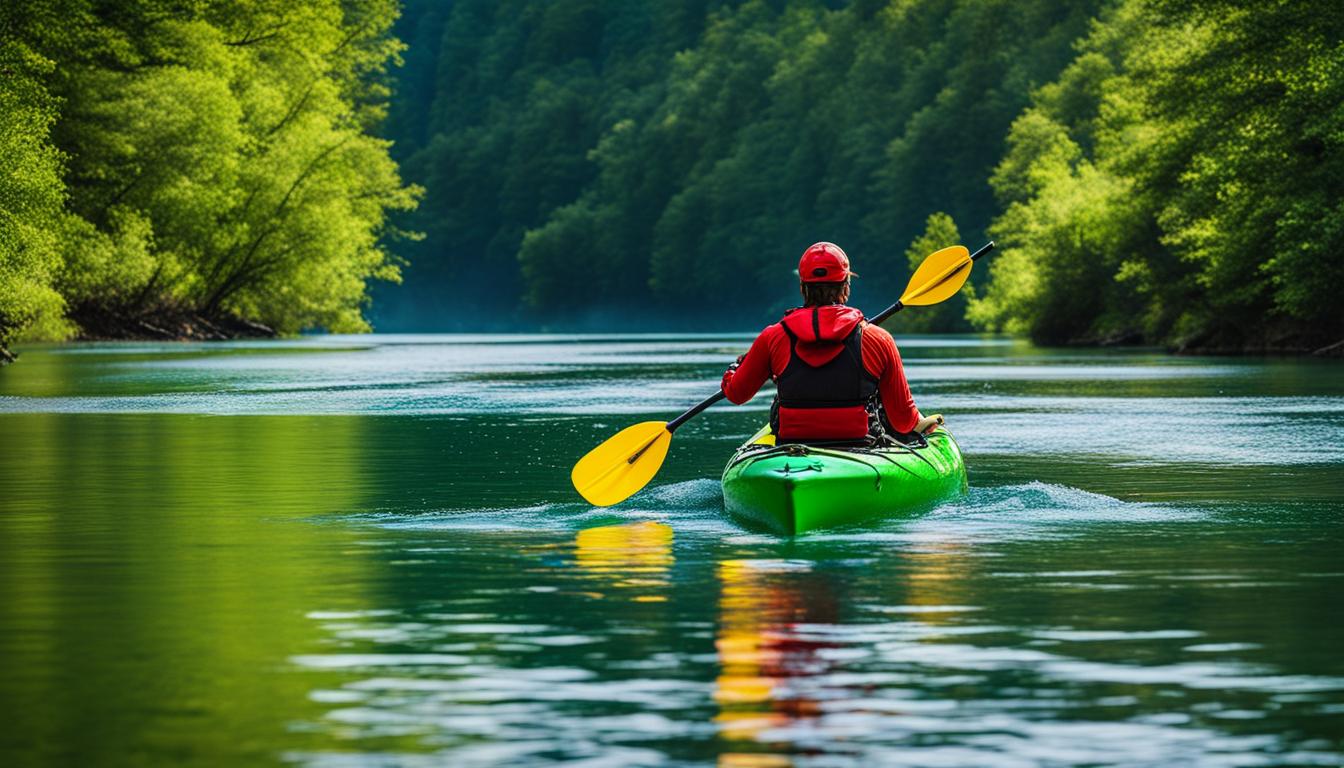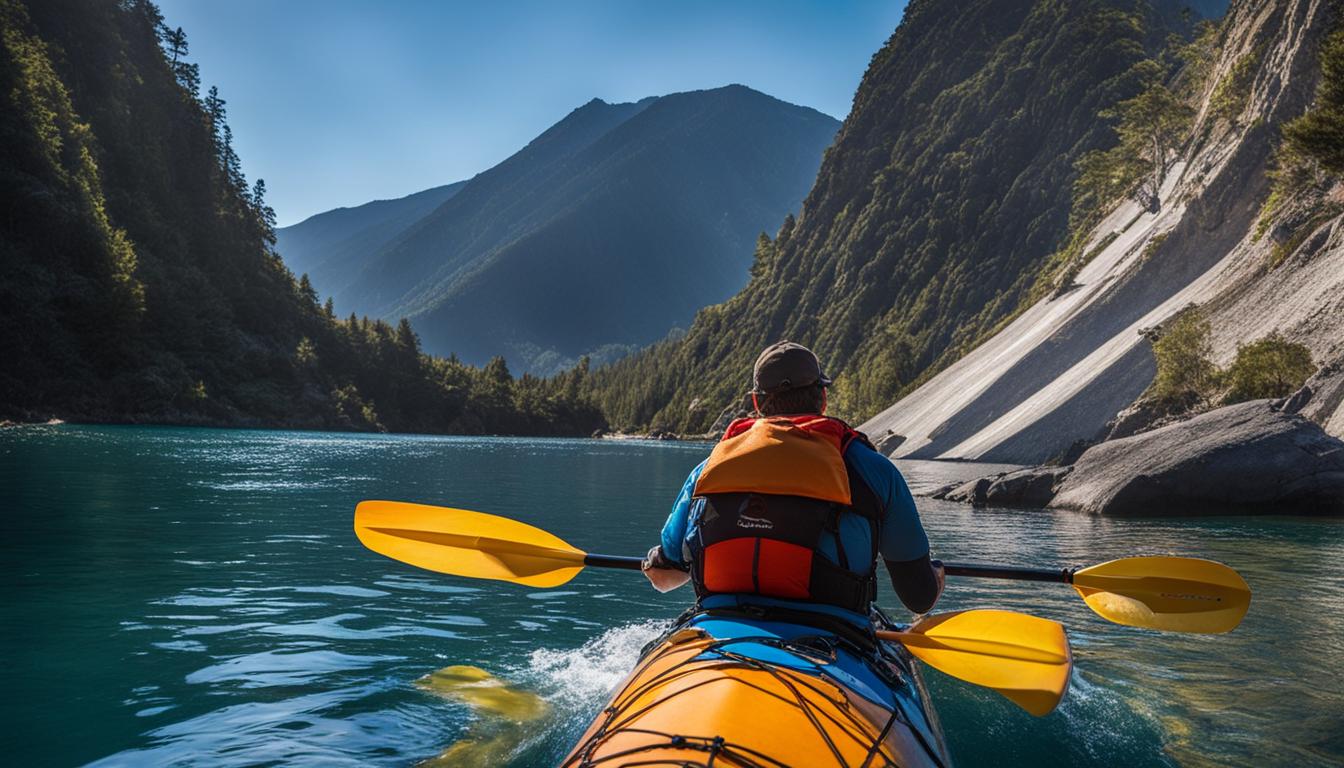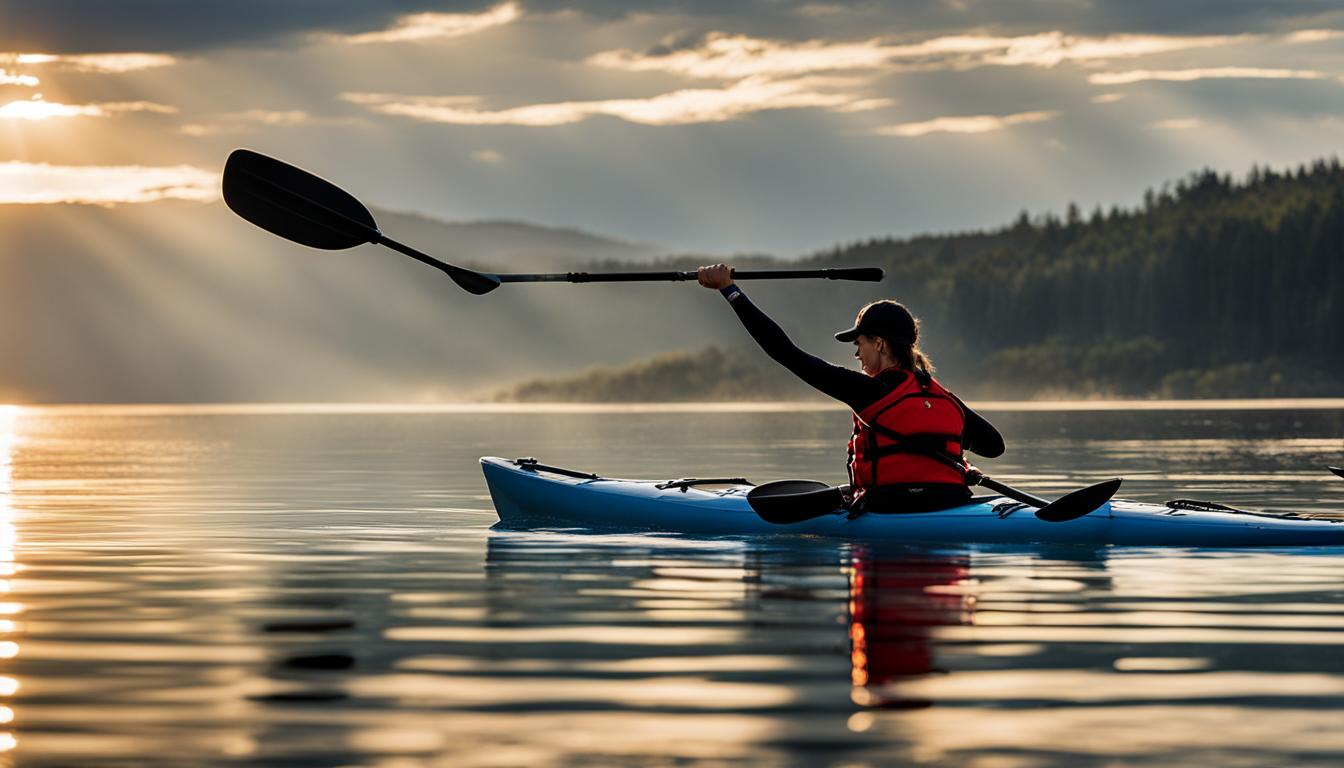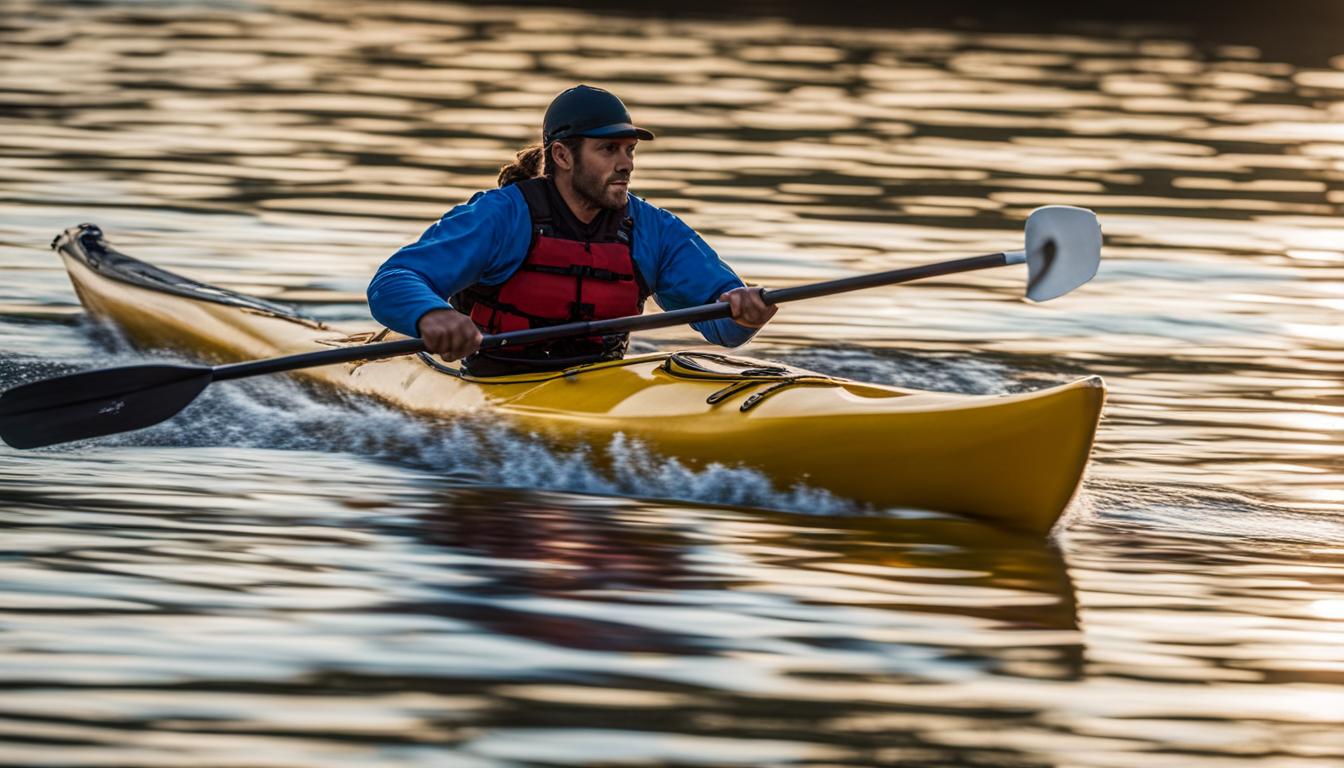Whether you’re a recreational paddler or a serious kayaker, proper nutrition is key to enhancing your performance and stamina on the water. Fueling your body with the right nutrients before, during, and after kayaking can make a world of difference in your experience. In this article, we will provide you with essential tips and insights on nutrition for kayakers, including what to eat and when to eat it.
Key Takeaways:
- Focusing on nutrition is vital for kayakers to optimize their performance and endurance.
- A balanced diet rich in carbohydrates, lean protein, and healthy fats is essential for sustained energy.
- Proper hydration strategies before, during, and after kayaking can help prevent fatigue and cramping.
- Timing your pre-kayaking meal and fueling with nutrient-dense snacks while paddling can maintain your energy levels.
- Recovery nutrition after kayaking, including a combination of carbohydrates and protein, aids in muscle repair and replenishing energy stores.
The Importance of Fitness for Kayakers
Kayaking is a physically demanding activity that requires a high level of fitness. Being fit not only enhances your performance on the water but also ensures your safety during kayaking adventures. Fitness for paddlers encompasses strength, cardio, endurance, and flexibility.
In terms of strength, kayakers need to focus on building functional muscles that support their paddling movements. This can be achieved through exercises such as core training, upper body strength exercises, and resistance training.
Cardiovascular fitness is crucial for paddlers as it increases their endurance and allows them to maintain a sustained level of performance throughout their kayaking sessions. Incorporating activities like running, cycling, or swimming into your fitness routine can improve your cardiovascular fitness.
Flexibility is essential for kayakers as it enables them to maintain proper paddling technique and reduce the risk of injuries. Incorporating stretching exercises and yoga into your fitness routine can help improve flexibility.
By focusing on fitness, kayakers can improve their paddling performance, decrease the risk of injuries, and handle challenging situations more effectively. Incorporating a well-rounded fitness routine into your kayaking training will ensure you are ready for any adventure on the water.
Kayaking Fitness Routine
| Exercise | Duration | Benefits |
|---|---|---|
| Core training | 3 times a week | Strengthens the muscles used for stability and balance in the kayak |
| Upper body strength exercises | 2 times a week | Builds strength in the arms, shoulders, and back for powerful paddle strokes |
| Cardiovascular training | 4 times a week | Improves endurance for longer kayaking sessions |
| Flexibility exercises | Every day | Increases range of motion and reduces the risk of injuries |
Remember that fitness is a journey, and consistency is key. Start slowly and gradually increase the intensity and duration of your workouts. Consult with a fitness professional to create a personalized kayaking fitness routine that suits your specific goals and needs.
Essential Nutrients for Kayakers
To fuel your body for kayaking, it’s important to consume the right nutrients. Kayakers need energy-rich foods that provide sustained fuel throughout their paddling sessions. Carbohydrates, such as whole grains, fruits, and vegetables, should be the main energy source in your diet. Additionally, lean sources of protein, like fish, chicken, beans, and tofu, aid in muscle repair and recovery. Healthy fats, found in avocados, nuts, seeds, and fatty fish, provide endurance and support joint health. It’s also essential to include a variety of vitamins and minerals in your diet to support overall health. Nutritional supplements can be beneficial for paddlers, but they should not replace a balanced diet.
When it comes to energy foods for paddlers, carbohydrates are the key. They provide the necessary fuel for sustained energy during your kayaking sessions. Whole grains, such as oatmeal, brown rice, and quinoa, are excellent choices as they release energy slowly, keeping you fueled for longer. Fruits and vegetables are also important for their vitamins, minerals, and fiber content. Include a variety of colorful fruits and vegetables in your meals to ensure you’re getting a wide range of nutrients.
Protein is crucial for muscle repair and recovery, especially after intense kayaking sessions. Opt for lean sources of protein like fish, chicken, beans, and tofu. These foods will help your muscles recover faster and reduce muscle soreness. Healthy fats are another important component of a kayaker’s diet. They provide sustained energy and support joint health. Include foods like avocados, nuts, seeds, and fatty fish in your meals to get these healthy fats.
In addition to a well-balanced diet, nutritional supplements can be beneficial for paddlers. However, they should complement your diet and not replace it. Talk to a healthcare professional or a registered dietitian to determine if any specific supplements are necessary for your individual needs. Remember, it’s always best to focus on whole foods as your primary source of nutrients.
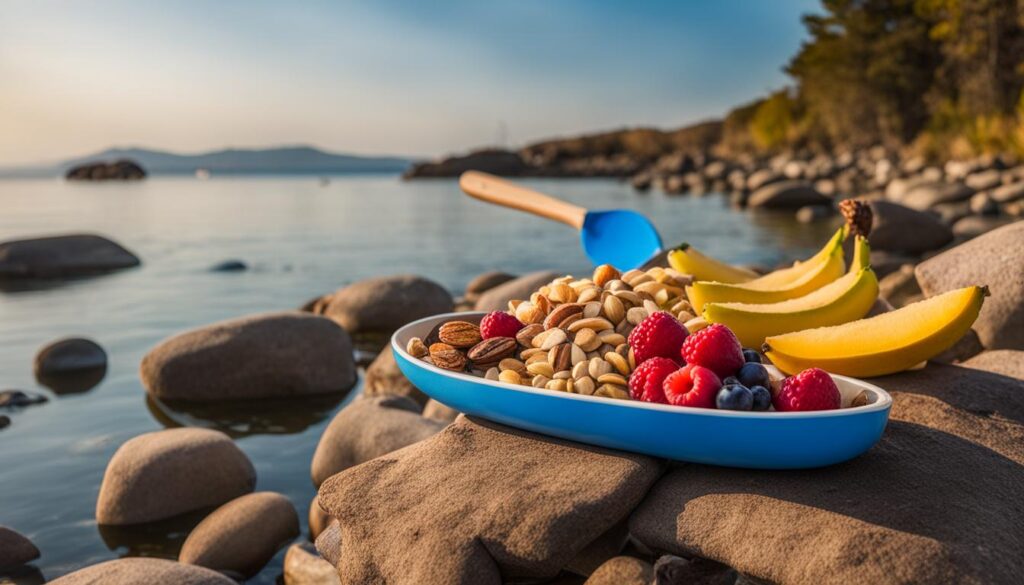
| Carbohydrates | Protein | Healthy Fats | Vitamins and Minerals |
|---|---|---|---|
| Whole grains (oatmeal, brown rice, quinoa) | Fish, chicken, beans, tofu | Avocados, nuts, seeds, fatty fish | Fruits, vegetables |
| Fruits, vegetables | |||
Kayaking Hydration Strategies: Stay Hydrated While Paddling
When it comes to kayaking, staying hydrated is essential for maintaining peak performance on the water. Dehydration can lead to fatigue, decreased endurance, and even increased risk of accidents. To ensure you stay properly hydrated during your kayaking adventures, follow these effective hydration strategies.
1. Start Hydrating Before You Hit the Water
Hydration should begin well before you embark on your kayaking journey. It’s important to start the day by drinking water consistently and including water-rich fruits and vegetables in your diet. This allows your body to start building its hydration levels and ensures that you begin your paddling session already well-hydrated.
2. Sip Water Regularly During Paddling
Hydration should be a continuous process while you’re kayaking. Make sure to carry enough fluids with you and sip water regularly throughout your paddling session. It’s important to find a fluid that works well for you and practice drinking it during your training sessions so that you’re comfortable and accustomed to it when you’re out on the water.
3. Avoid Dehydrating Substances
To maintain proper hydration while kayaking, it’s crucial to avoid substances that can dehydrate your body, such as caffeine and alcohol. These can increase fluid loss and hinder your body’s ability to retain water. Stick to water or other non-dehydrating fluids to keep your body properly hydrated during paddling.
4. Listen to Your Body
Every paddler is different, and hydration needs can vary depending on factors like exertion level and environmental conditions. It’s important to listen to your body’s thirst cues and drink when you feel the need. Don’t wait until you’re excessively thirsty, as this can indicate that you’re already becoming dehydrated.
| Signs of Dehydration | Signs of Proper Hydration |
|---|---|
| Dry mouth and throat | Moist mouth and clear saliva |
| Feeling thirsty | Feeling satisfied and not excessively thirsty |
| Dark yellow urine | Pale yellow urine |
| Feeling fatigued or weak | Feeling energized and alert |
By following these hydration strategies, you’ll be able to maintain optimal performance and endurance while kayaking. Remember to prioritize proper hydration before, during, and after your paddling sessions to ensure a safe and enjoyable experience on the water.
Proper hydration is key to staying energized and performing at your best while kayaking. Don’t wait until you feel thirsty to drink water; make it a regular part of your kayaking routine. Your body will thank you.
Pre-Kayaking Nutrition Tips
Your pre-kayaking meal plays a vital role in providing the necessary fuel and energy for your paddling session. Aim for a balanced meal that includes carbohydrates, protein, and a small amount of healthy fats. A meal rich in pasta, rice, or other complex carbohydrates with some lean protein, like chicken or fish, will help replenish energy stores and support muscle function. It’s important to time your meal at least 1-2 hours before kayaking to allow proper digestion. Snack on nutrient-dense foods like bananas and muesli bars to keep your energy levels stable during your paddling session.
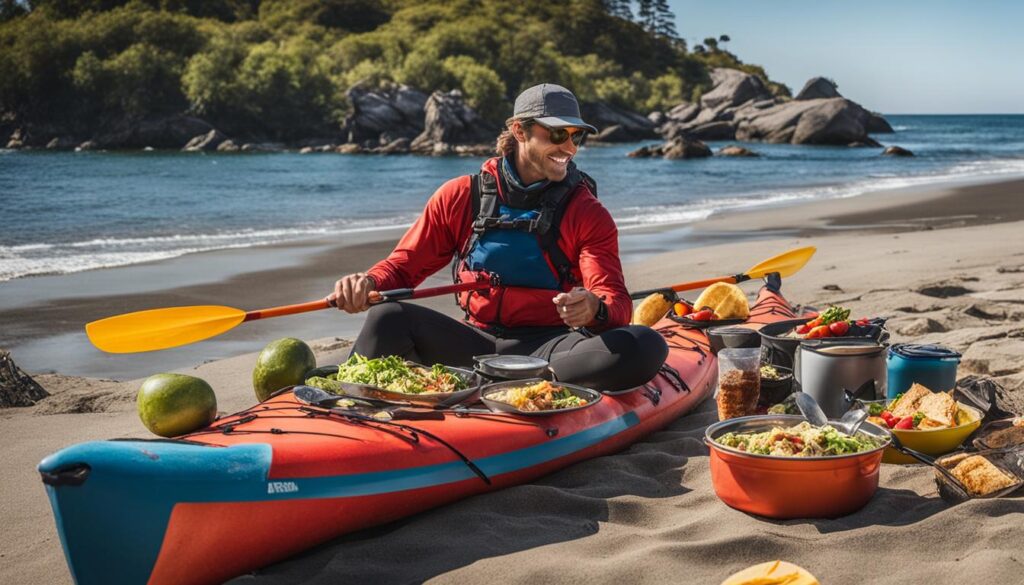
Tips for pre-kayaking nutrition:
- Include complex carbohydrates, lean protein, and healthy fats in your pre-kayaking meal for sustained energy.
- Time your meal at least 1-2 hours before kayaking to allow for proper digestion.
- Snack on nutrient-dense foods like bananas and muesli bars to keep your energy levels stable during your paddling session.
“A balanced meal with the right mix of carbohydrates, protein, and healthy fats will provide the necessary fuel for your kayaking adventure.”
By following these pre-kayaking nutrition tips, you’ll ensure that your body is properly fueled and ready to take on the water. Remember to listen to your body and adjust your food intake based on your hunger cues. With the right nutrition, you’ll be able to perform at your best and enjoy every moment of your kayaking experience.
Kayaking Nutrition Tips during Your Paddling Session
When you’re out on the water, it’s important to fuel your body with the right snacks to maintain your energy levels. Here are some kayaking fueling strategies and snacks to keep you energized:
- Pack nutrient-dense snacks like fresh fruits, trail mix, and energy bars. These snacks provide sustained energy and are easy to carry in your kayak.
- Include snacks that are rich in carbohydrates to replenish your glycogen stores and provide a quick source of fuel. Some good options include bananas, energy gels, and granola bars.
- Protein is also important for muscle recovery during your paddling session. Consider packing some Greek yogurt or protein bars to help repair and build muscle.
- Stay hydrated by sipping water regularly. Dehydration can negatively impact your performance, so make sure to bring a water bottle or hydration pack with you.
Remember to listen to your body’s hunger cues and fuel it with nutritious snacks. Avoid heavy, greasy foods that can cause discomfort and reduce performance. By following these nutrition tips during kayaking, you’ll be able to maintain your energy levels and maximize your time on the water.
Recovery Nutrition for Kayakers
After an exhilarating kayaking session, it’s important to prioritize your body’s recovery to ensure optimal muscle repair and replenishment of energy stores. Proper post-kayaking nutrition plays a crucial role in this process, helping you bounce back faster and prepare for your next adventure on the water.
One essential aspect of post-kayaking nutrition is consuming a well-balanced meal or snack within 30 minutes to one hour after paddling. This window of time is when your body is most receptive to replenishing glycogen stores and promoting muscle recovery. Consider incorporating a protein-rich smoothie with fruit and a source of healthy fats, such as avocado or nut butter. This combination provides the necessary nutrients to support muscle repair and replenish energy levels.
Hydration is equally important during the recovery phase. Drink plenty of water to rehydrate your body and support optimal functioning of your muscles and organs. Additionally, including hydrating foods in your post-kayaking meal, such as watermelon or cucumber, can help replenish electrolytes and aid in recovery.
Lastly, don’t neglect the importance of rest and sleep in your recovery routine. Allow your body to recharge and repair itself by ensuring you get enough quality sleep each night. This will optimize your body’s ability to recover and perform at its best during your next kayaking adventure.
Key Points: Recovery Nutrition for Kayakers
- Consume a well-balanced meal or snack within 30 minutes to one hour after kayaking.
- Include a combination of carbohydrates, proteins, and healthy fats to promote muscle repair and replenish energy stores.
- Stay hydrated by drinking plenty of water and consider incorporating hydrating foods in your post-kayaking meal.
- Prioritize rest and sleep to allow your body to recover and prepare for your next kayaking adventure.
“Proper post-kayaking nutrition enhances muscle recovery and prepares your body for the next adventure on the water.”
Conclusion
Proper nutrition is essential for kayakers to optimize their performance and achieve peak stamina on the water. By focusing on a balanced diet that includes energy-rich foods, following hydration strategies, and timing your meals appropriately, you can enhance your paddling performance. Additionally, maintaining overall fitness and incorporating stretching and warm-up routines will help prevent injuries and ensure a safe paddling experience.
When it comes to meal planning for paddling performance, aim for a balanced meal that includes carbohydrates, protein, and healthy fats. This will provide the necessary fuel and energy for your kayaking sessions. Consider consuming a meal rich in complex carbohydrates and lean protein at least 1-2 hours before paddling. Snack on nutrient-dense foods like bananas and muesli bars during your paddling session to maintain stable energy levels.
Remember to listen to your body and adjust your nutrition and hydration accordingly. Stay hydrated by sipping water regularly, and pack small, frequent snacks to fuel your body during breaks. With the right nutrition, training, and proper care for your body, you’ll be able to enjoy kayaking to the fullest and reach your optimal performance on the water.
FAQ
What should I eat before kayaking?
Aim for a balanced meal that includes carbohydrates, protein, and a small amount of healthy fats. A meal rich in pasta, rice, or other complex carbohydrates with some lean protein, like chicken or fish, will help replenish energy stores and support muscle function. Time your meal at least 1-2 hours before kayaking to allow proper digestion. Snack on nutrient-dense foods like bananas and muesli bars to keep your energy levels stable during your paddling session.
What should I eat during kayaking?
It’s important to fuel your body with small, frequent snacks to maintain energy levels. Pack nutrient-dense snacks like fresh fruits, trail mix, Greek yogurt, and energy bars in your kayak to consume during breaks. These snacks provide sustained energy and help prevent energy crashes. Remember to stay hydrated by sipping water regularly during your paddling session. Avoid heavy, greasy foods that can cause discomfort and reduce performance. Listen to your body’s hunger cues and fuel it with nutritious snacks to keep your energy high.
What should I eat after kayaking?
After a kayaking session, consume a meal or snack rich in both carbohydrates and protein within 30 minutes to one hour. A smoothie with fruit, protein powder, and a source of healthy fats can be a convenient option. This combination will help replenish glycogen stores and support muscle recovery. Pay attention to your paddling muscles and any areas that need extra care. Stay hydrated and eat a well-balanced meal for overall recovery.
How important is hydration for kayakers?
Staying hydrated is crucial for kayakers to maintain performance and prevent fatigue and cramping. Start hydrating even before you hit the water by drinking water consistently throughout the day and including water-rich fruits and vegetables in your diet. During your paddling session, carry enough fluids and sip water regularly. Find a fluid that works well for you and practice drinking it during your training sessions. Avoid caffeine and alcohol, as they can dehydrate your body. Proper hydration is essential for optimal kayaking performance.
Why is fitness important for kayakers?
Fitness is important for kayakers because kayaking is a physically demanding activity that requires strength, cardio, endurance, and flexibility. Proper fitness enhances your performance and ensures your safety on the water. Being fit allows you to paddle for longer durations, reduces the risk of injuries, and enables you to handle emergencies effectively. Focus on building functional muscle, improving cardiovascular fitness, increasing endurance, and maintaining flexibility to be a fit paddler.
What are the essential nutrients for kayakers?
Kayakers need energy-rich foods that provide sustained fuel throughout their paddling sessions. Carbohydrates, such as whole grains, fruits, and vegetables, should be the main energy source in your diet. Lean sources of protein, like fish, chicken, beans, and tofu, aid in muscle repair and recovery. Healthy fats, found in avocados, nuts, seeds, and fatty fish, provide endurance and support joint health. It’s also essential to include a variety of vitamins and minerals in your diet to support overall health. Nutritional supplements can be beneficial for paddlers, but they should not replace a balanced diet.

